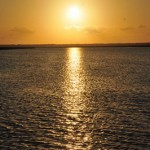Thoughts from my beach chair on Fripp Island, S.C.
Of all God’s creation, perhaps the sea is the most generous.
And most abused by us.
There is no point on a beach, no vista even from on high, where one set of eyes can consume its expanse, its absurd breadth and distance, not to mention its frightening depths.
I look at that expanse and wonder how even the small slice of it I can see isn’t able to serve the entire world. It’s that impressive to me, that huge to my meager mind.
The sea is truly awesome, inspiring, tantalizing and terrifying all at once. Sailors say its beckon call cannot be ignored—though I wonder if it’s the siren song of faraway shores or the spare solitude of the actual waterway itself that draws them in.
Beach goers, like me, stare at it idly for hours, days at a time, play in its shallows, tan at its edges, drink beer in its knee-depths. What child, after spending a day rollicking in its surf, ever looks at a calm, concrete pool the same way again? That’s like comparing the thrill of a trampoline to the boredom of an asphalt lot.
The sea gives us abundant food—the very lives of creatures—to consume for our pleasure. The variety, even in this age of science, still seems limitless.
It gives us cool breezes in summers, and, though our collective skin may beg to differ, warmer air during winters; perhaps those winds’ dampness skew the story unfairly.
Some of its beasts seem born merely entertain us: whales, dolphins, turtles, swimmers who dare trust man to come close enough for a good look while delivering a seemingly friendly flip of a fin.
But make no mistake, each of their roles, and the roles of countless other dwellers of the depths are crucial to the complexity of that ecosphere, be they animated or static. Everything in the sea has a job; nothing is made just for show.
The sea works on its own, beautifully, magnificently, without need of human interference. Its tides are predictable to the minute, drawn to and fro by the gravitational pull of a lifeless gray globe 220,000 miles away.
It operates without human input, slowly and persistently rearranging our beaches with every advance, every retreat. We watch those tides waiting for permission to join them, awed by their precision. We trust their rise will float our boats, their descents won’t steal our chairs and towels. And they’re always honest.
Other than Himself, the sea is perhaps God’s greatest gift to us: bountiful, benevolent, beautiful above and below, inside and out. Much like the Creator, the sea always gives without asking—as if we had anything to offer it.
But we do give back: our sewage, the record of our lives spelled out in careless, useless and endless clots of flotsam—garbage sometimes made of materials harvested from the sea itself.
What a selfish lot we are.

Leave a Reply